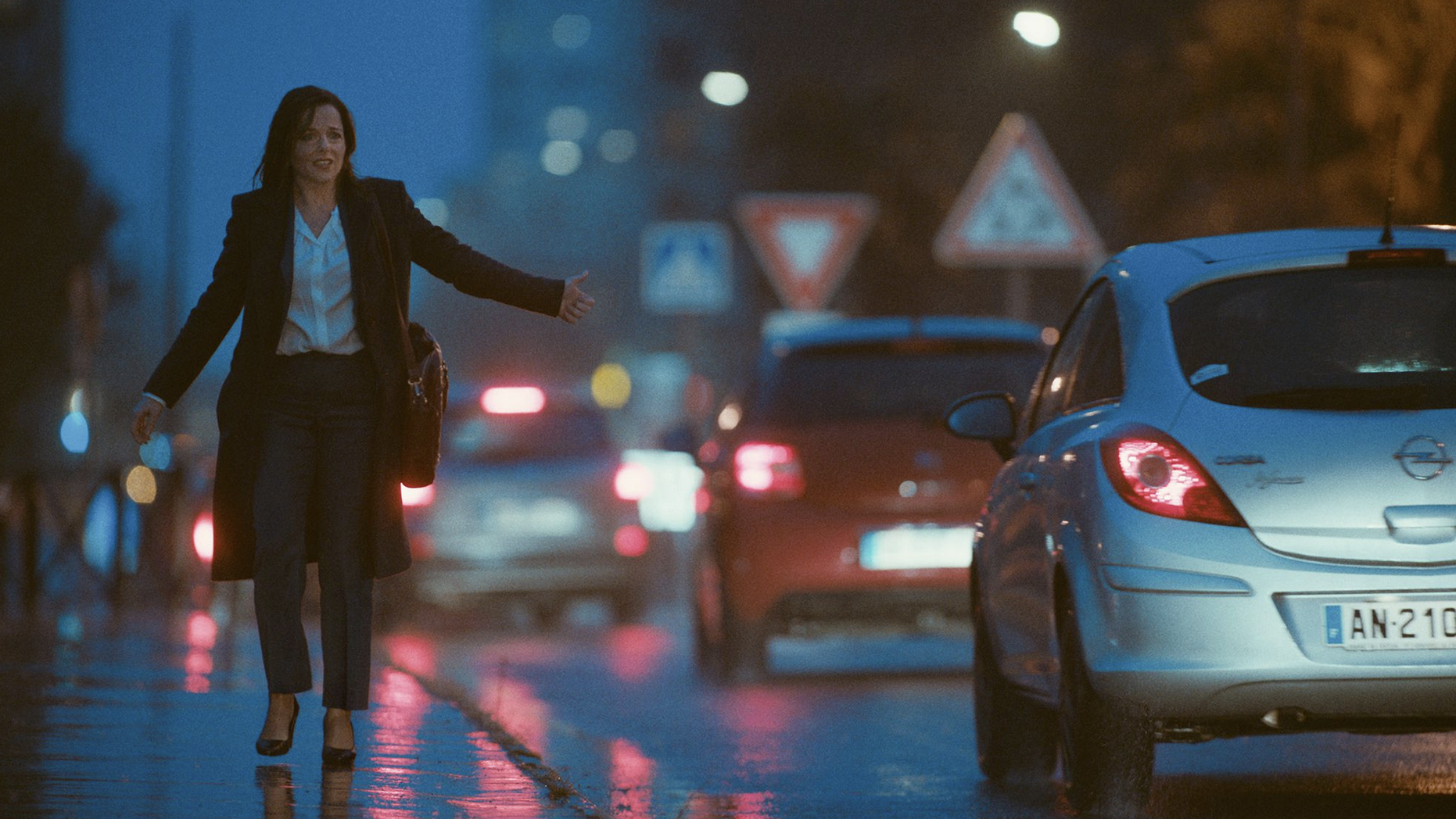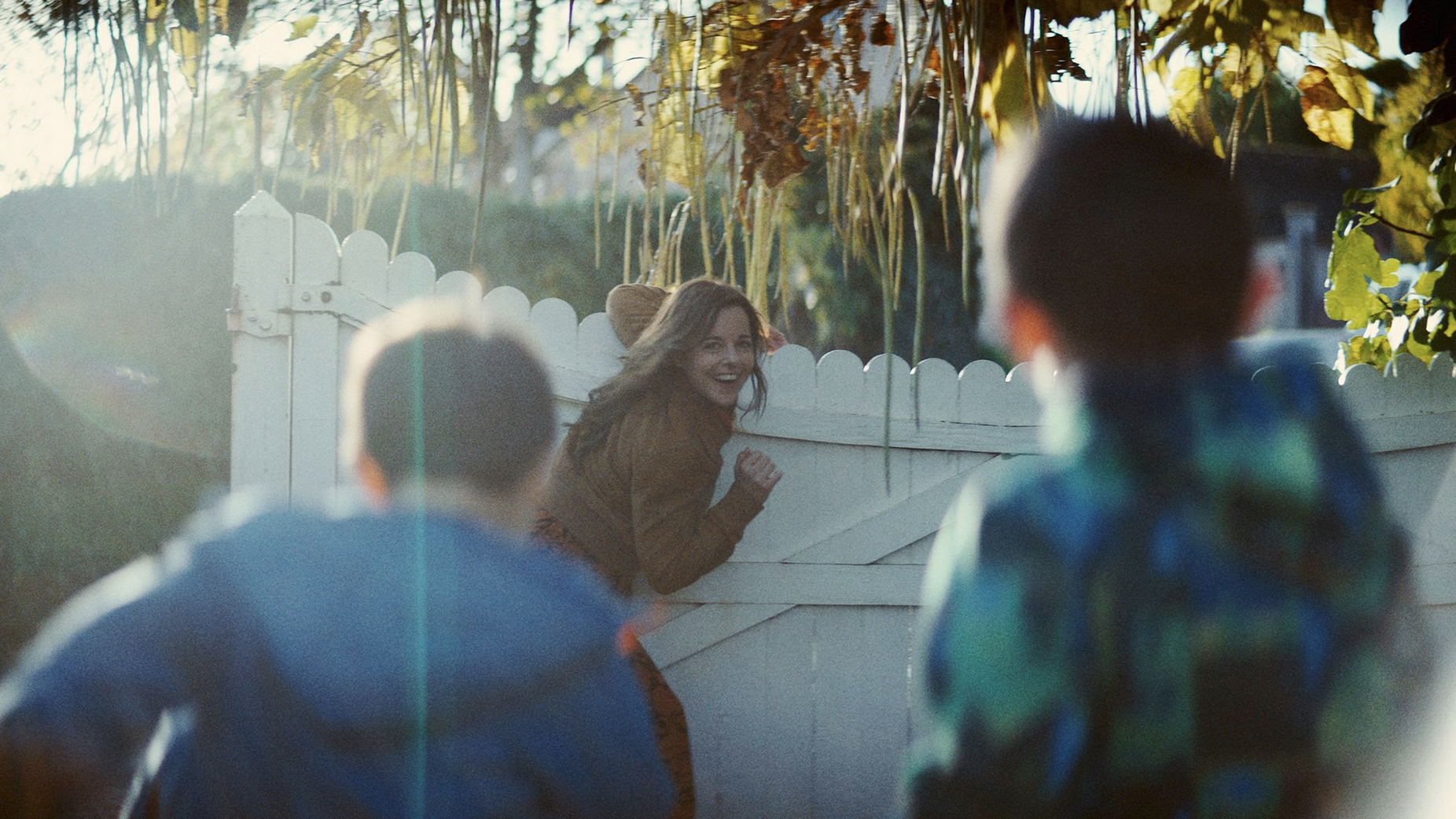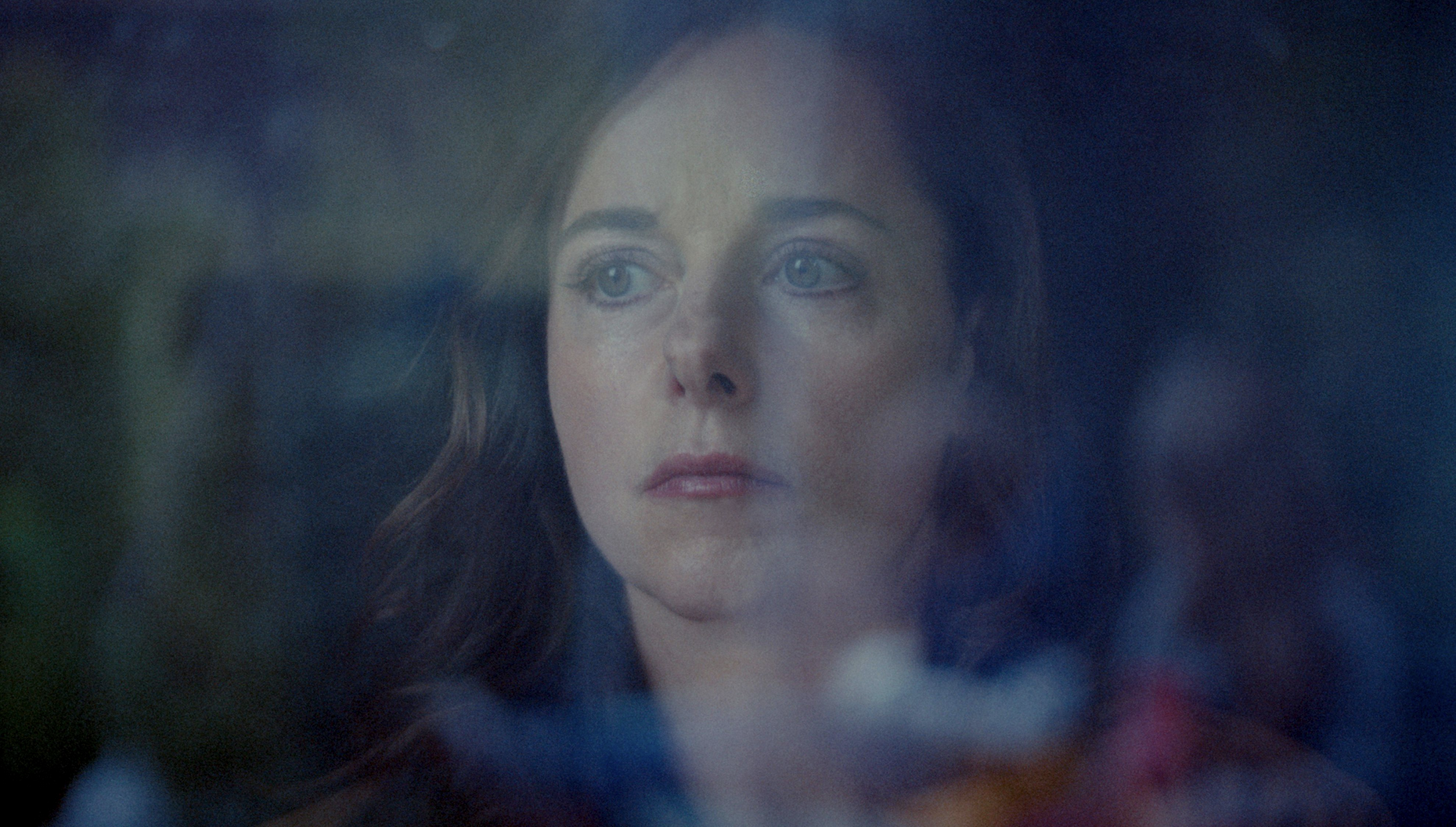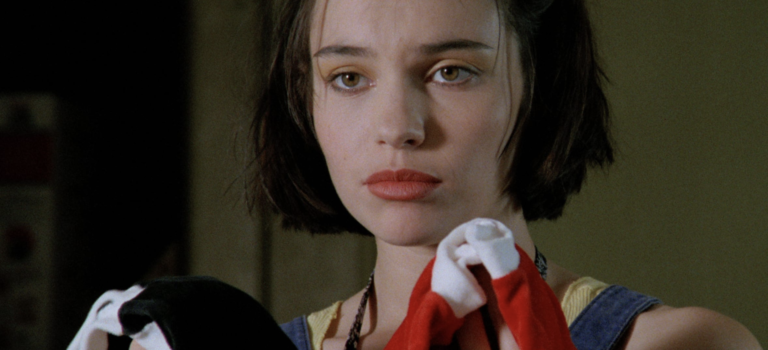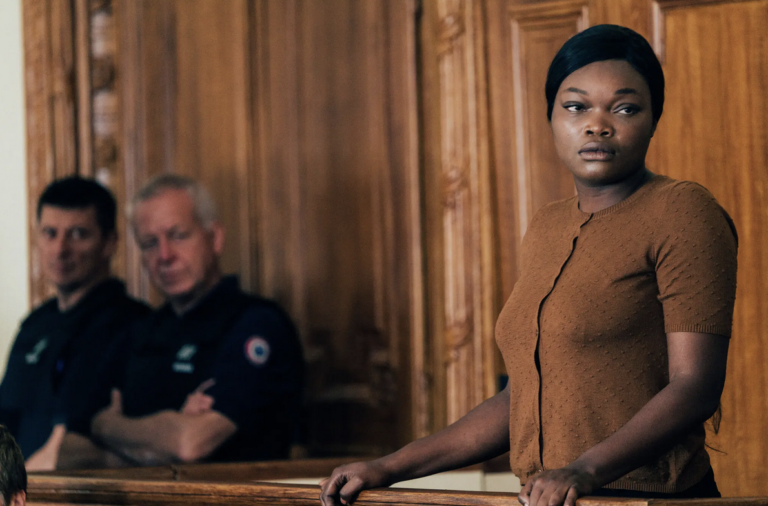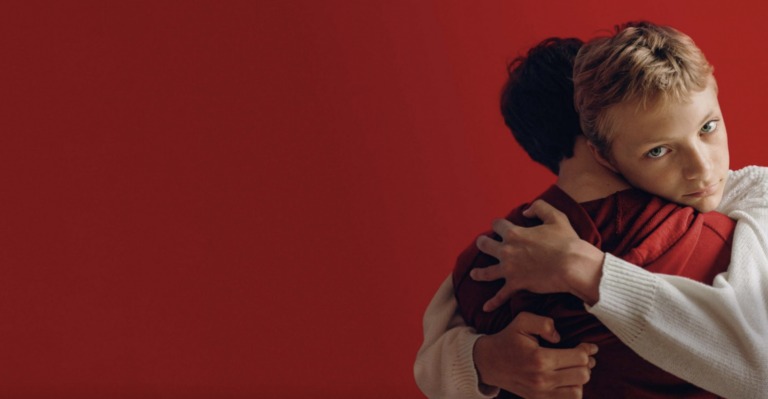Julie, the single mom at the center of Éric Gravel’s Full Time, never stops moving. It’s still dark when she leaps from her bed, feeds her kids, fixes the broken boiler to give them a hot bath, drops them at the neighbor’s house up the road, and jumps through the doors of a train seconds before they shut. When the train stops suddenly, thanks to the familiar French scourge –a nationwide transit strike–she races to make the bus, then the subway, bolts through the last leg on foot to her job as the head chambermaid at a five-star Paris hotel. A warning from her boss. Apologies all-around. Today at least everyone gets it. La grève is making everyone’s life miserable. But let’s be clear, the hotel clients don’t care about the cleaning staff’s personal dramas. Their beds must be made to perfection, their rooms sparkling and smelling sweet as honey, the décor fit for kings.
Played by Laure Calamy (Call My Agent!, My Donkey, My Lover & I), whose performance in this new film landed her the award for best actress at the 2021 Venice Film Festival, Julie is a picture of grace under pressure. As the single mom of two young children in the suburbs, who works in Paris, she wakes before dawn to get her kids ready for school and comes home after dark. With the strike in full force, half the time she doesn’t know how she’ll get to and from work. Sometimes there’s a carpool from the station. Sometimes she hitchhikes in the rain. Once she rents a van she can’t afford.
During her commute, we hear urgent chatter on the radio: The city is an inferno…Paris in shock…the protests, the chaos, the violence… One night she begs the sitter—an older woman who can barely handle Julie’s energetic kids in the best of times—to keep them overnight and shells out for a seedy Paris hotel. Frequently, while running to work, she fields calls from the bank about her overdue mortgage payment. Calls to her ex about his late alimony check go straight to voicemail. Then she lands a job interview. See, before the kids, Julie worked in marketing—she’s a chambermaid with a master’s degree—and suddenly there’s an opening. But how in the hell can she go to an interview on top of everything else? She lies a little, cheats a little, begs a little, each time making the viewer cringe (and pray) a little.
Julie can’t catch a break. And yet, she remains calm—most of the time. She jokes with her kids. On the way to the train, she manages to shop for a birthday present for her son, whose party she’s planning for this weekend, in between the five-star fires she’s got to put out.
The film is beyond anxiety-inducing. It has the propulsive tension of a thriller, easily as breathlessly suspenseful as Uncut Gems, Speed, The Wages of Fear. The pressure doesn’t let up and we wonder how it ever will. With each new obstacle piled on top of existing ones, Julie’s anxiety spikes. The stakes couldn’t be higher. She must pay the bills. She must feed her kids and find someone to watch them while she works. These are everyday struggles we understand, struggles she can usually handle, but the strike pushes her over the edge.
Director Gravel and his cinematographer Victor Seguin keep us right up next to Julie from the start. The film begins in the dark, in a rare moment of almost total silence and stillness. The only sound is the calm, nighttime breathing of sleep, the image an abstracted view of skin, a body, in the night. We’re so close, it’s hard to discern what exactly we’re seeing. Light on skin, vibrating with the gentle effort of breath, the camera up close, caressing skin. An alarm goes off and eyelashes flutter awake. Julie’s eyes open. And she’s off. The cinematography is striking throughout, capturing Julie’s almost incessant movement. And then, like a sip of water after strenuous exertion under a punishing sun, a pause. A beat of stillness—through glass, her face delicately washed in reflections of the world outside. Generally an expression of concern in her eyes—how do I get out of this mess?—but there are moments, if not of joy, then at least relief. A ride to work. Sun on her face. A bath with her kids.
Paris is not a city we recognize here. It’s a sprawling grey concrete hellscape, the streets clogged with traffic, buildings belching smoke and fire. The city is a major source of Julie’s frustration—the place she goes every day, with insurmountable obstacles placed along her path in an excruciating video game that’s unfortunately real, yet it’s a necessary evil. Where else can she earn enough to support her family? At one point, we see the Eiffel Tower and think, “Oh yeah, she’s in Paris,” only it’s framed in the tiny window of the cheap hotel where she spends a night when she can’t get home. The upside, no commute in the morning, a night alone, only she can’t sleep with the noise of the city outside. The only true moment of peace, of silence, occurs at the top of a glass tower, when she’s waiting for her job interview to begin. She takes deep breaths in a glass room, far from the chaos of her life.
We want Julie to get the job—we’re rooting for her—but it would mean perpetuating the madness. It would be a better use of her talents, but she’d still be forced to endure the commute. She would never stop running. Maybe she’d be better off bagging groceries up the road, like her babysitter suggests. It couldn’t be any worse than cleaning rock stars’ shit off the hotel room walls.
There are no easy answers. While Julie’s situation is extreme, her story holds up a mirror to all of us. Who doesn’t spend their days running? Even those who work from home battle to-do lists that make our heads spin. We all balance work, family, a never-ending battery of financial, social, and domestic demands. When do we get to pause and take a break? When do we get to stop and enjoy the soft simple fruits of our labor?
Full Time will open exclusively in theaters on Friday, February 3rd, in New York (Quad Cinema), followed by Los Angeles (Laemmle Royal) on Friday, February 10th, and a national rollout.
Andrea Meyer has written creative treatments for commercial directors, a sex & the movies column for IFC, and a horror screenplay for MGM. Her first novel, Room for Love (St. Martin’s Press) is a romantic comedy based on an article she wrote for the New York Post, for which she pretended to look for a roommate as a ploy to meet men. A long-time film and entertainment journalist and former indieWIRE editor, Andrea has interviewed more actors and directors than she can remember. Her articles and essays have appeared in such publications as Elle, Glamour, Variety, Time Out NY, and the Boston Globe.


